- Home
- Laini Taylor
Night of Cake and Puppets (a Daughter of Smoke and Bone novella) Page 6
Night of Cake and Puppets (a Daughter of Smoke and Bone novella) Read online
Page 6
Intriguing…
My phone is vying for my attention. It’s a string of texts from Karou, all along the lines of: Hello? Z???
My fingers are shaking a little with thrill shivers as I type back: You’re a genius and a savior. THERE IS A NOTE! <3 <3
I have never in my life typed a heart symbol. Those are for milquetoast girls. Karou will probably think my phone’s been stolen – or possibly my body, by a lovelorn alien. I send the text anyway.
This is what comes back: …who is this??
Me: Don’t you dare mock me.
Karou: You’re not going to start collecting heart-shaped rocks or anything, are you? Because we might have to renegotiate our friendship.
And I have some time to kill before the mysterious twenty minutes elapse, so I call her – stupid texting, anyway; sometimes it takes a ridiculously long time to think of actually dialing the phone and speaking instead of typing away like numbskulls – and I assure her emphatically that there is no heart-shaped rock collection in my future. ‘Toes,’ I say, thinking of my grandfather’s supposed golem souvenir. ‘I’m going to take toe trophies from all my boys from now on,’ and if Karou knows that ‘all my boys’ so far equals zero boys, she doesn’t let on.
‘That’s more like it,’ she says.
It’s really good to hear her voice. She tells me she’s going to Pakistan next. Pakistan! I issue all sorts of ill-informed warnings that she doesn’t need, like to wear a burqa and not do any random sexy dancing in public, and she keeps trying to bring the conversation back to me and Mik.
Me & Mik.
I’ve never been part of an ampersand before. Never a ‘we,’ never an ‘us,’ but by the time I get off the phone and start walking – slowly, as directed – in the direction of the Devil’s Stream, I’m feeling pretty good about my chances. It may be a grand delusion, but the feeling carries me along like I’m floating, and in no time at all, I’m nearing the footbridge at the end of Velkoprevorske Street, wondering where to go next. And that’s when I hear it.
Music.
10
Peacock Footprints
Violin. Live and real and drifting with the snow. It’s Eine kleine Nachtmusik, which I’ve heard so many times that I didn’t even realize, until hearing it now, that it had become…mundane. Oh, yeah, Mozart’s such a genius. What’s for dessert? But hearing it like this, outside, at night, in a snowfall and meant for me…it’s newly born in my mind as the sublime creation that it is. It’s the Andante, softer and sweeter than the Allegro, and it’s just…I can’t even explain it.
It’s a dimension. The space around me, the world above me – until just now a void of night air beset by snow flurries – becomes a living thing. Music. Close your eyes and it’s a rosebush blooming in time lapse so that its shoots and blossoms flow outward in a swift choreography of growth and collapse, twine and coil, release and fade.
Close your eyes and music paints light vines and calligraphy on the darkness within you.
It draws me forward, like a hand extended. Mik is on the other side of it, somewhere as yet unrevealed, his music making a trail straight to him, and I’m so grateful in the moment that it’s not an ordinary person I’ve fallen for, and not even an ordinary musician, but a violinist.
As soon as I step onto the footbridge I see him. There’s the mill wheel just beside the bridge – the cute wooden mill wheel every tourist to Prague snaps a photo of – and Mik is down on the narrow dock beside it, barely ten feet away. There’s a wall between us, though, concrete topped with an iron fence, and my miniature self has to stand on tiptoe to peer through the bars. His head, cozied by his knit cap, is bent over his violin, his posture is loose and fluid, he’s blushing his blush of exertion and creation, and nothing has ever been quite as amazing as the fact that this perfect sound is the result of the smooth, deliberate swing of this beautiful boy’s arm.
I’m not the only person who’s been drawn to the music. Passersby are stopping to listen. Some windows clatter open in the buildings fronting the stream, and for a minute everyone is still, bent toward this lovely sight: Mik on the mill dock, playing Mozart to the snow.
No, not to the snow. To me.
Eine kleine Nachtmusik is Mozart’s Serenade 13. Serenade.
World, I think it’s important to acknowledge here that I am being serenaded. The Charles Bridge arcs in the backdrop, its lampposts ghostly. The canal is black and glinting, and the night is saying: Yep. Everything is miraculous.
Indeed, Picasso. Indeed.
‘Excuse me,’ I say to a couple who are paused nearby, leaning into each other so that their breath plumes mingle and become one. ‘Can you boost me up?’ I gesture to the wall. It’s high, with pointy iron finials to further discourage what I am about to do, but the couple make no effort to dissuade me. They smile like they’re in on a secret, and the guy makes a stirrup with his hands, and up I go. That’s when Mik looks up. Right when I’m balanced on top of the wall.
Our eyes meet, and all this rigamarole and scheming, the back-and-forth across the bridge and diving behind tombstones, it all comes down to this moment.
Our eyes meet.
And…it’s like all my life I’ve been this tower standing at the edge of the ocean for some obscure purpose, and only now, almost eighteen years in, has someone thought to flip the switch that reveals that I’m not a tower at all. I’m a lighthouse. It’s like waking up. I am incandescent. I never knew I could emit heat and light. Damn. If the music created an external dimension, this creates an internal one.
There is more to me than I knew.
Mik smiles, and it’s such a mix of glad and shy and sweet and eager and even a little bit of what I could swear is amazed – like he’s amazed by his good fortune that I am climbing over a wall to him – that it triggers a kindred smile in me. My face responds without authorization from my brain, so the resulting smile feels like the biggest, most unguarded, goofiest smile I’ve ever unleashed in my entire life. I didn’t even know my face could do this. It’s like there were hidden zippers in my cheeks. Jesus.
This must be what feelings are. This is why people write poems! I get it now.
I get it, and I want more.
I start to climb down the outside of the bridge. Or, well, I look down for clues as to how I might accomplish this last, crucial step to finally entering Mik’s magnetic field, but it’s a far drop to the little metal walkway below, and I hesitate. And no sooner do I hesitate than Mozart hesitates. By which I mean, Mik’s bow falters over the strings and the music cuts off, and when I look back up, he’s laying his violin and bow in their case and coming toward me. There’s a light smattering of applause, but I’m not going to be distracted by anything outside the circle of this moment.
Here’s the situation. Me: clinging to the outside of the bridge. Mik: on the metal walkway below. His head is about even with my feet. He’s looking up at me, and our eyes meet again and I’m thinking I love your face at him because it’s just the best face and I can’t help imagining a situation in which we are standing with our foreheads and nose tips touching, and it’s only now that I realize the lighthouse radiance I feel myself emitting is actually blushing. He’s blushing, too, and with the distance reduced between us there’s the sensation that our blushes are meeting in the middle. The edges of our magnetic fields are bumping against each other.
And then Mik speaks. All he says is ‘Hi,’ but he says it like he’s breathing it out on a plume of pure awe, and it melts me.
‘Hi,’ I say back. A word spoken, and no mouth malfunction. Granted, it’s only hi, but it’s the most meaningful hi I’ve ever said, and it doesn’t even sound like my voice. It sounds like it belongs to some girl with a heart-shaped rock collection, and I defiantly do not care. ‘Help me down?’ I ask.
And he reaches for me. I crouch to sit on the edge of the concrete wall, the iron of the rail hard at my back. I find I’m still just a little out of range of Mik’s hands, so I have to tip forward, fal
l to him and let him catch me. And I do. And he does. And it’s like I’m watching myself do this thing – fall into Mik’s waiting arms, into his magnetic field at last – from a great distance. He catches my waist, so padded by my sweater and coat that it’s just pressure and not even the feeling of hands, and I catch his shoulders, likewise coat-padded but still nice and boy-shouldery, and he sets me down in front of him, simple and neat, and here we are, squarely arrived at the talking portion of the evening.
There’s a long pause.
But it’s not a bad pause, because Mik is looking at me like I’m the treasure from the high shelf that someone’s just taken down and put into his hands. I find I don’t mind being looked at like this. I don’t mind it at all.
‘I got your note,’ he says.
‘I got yours, too.’
‘I can’t draw,’ he says a little quickly, like he’s offering an apology, and I know he’s just as nervous as I am.
‘And I can’t play the violin,’ I counter. ‘That was…beautiful.’ It’s such an understatement. Sublime might begin to get at what it was, but that would just sound pretentious.
He shakes his head, humble. ‘That was nothing. I mean, don’t tell Mozart I said that. But it wasn’t like what you did tonight. I don’t even know what to say. It’s the coolest thing anyone’s ever done for me.’
‘What, run you all over town in the snow?’ It’s my turn to act humble. It was really cool. I am well aware.
‘Yeah, like that’s all it was. I don’t even know how you did some of that stuff.’ There’s a brief pause before he adds, ‘But don’t tell me. I want to just think it was magic.’
‘It was magic,’ I say simply. I’ve learned this from Karou, as regards magic: You can tell the most outlandish truths with virtually no risk of being believed.
Except, apparently, in the case of Mik. ‘I believe it,’ he says. ‘This is pretty much what I imagined your Saturday nights are like.’
Pause. Consider. Unpause. ‘You imagined my Saturday nights?’
‘Yeah,’ he says, with a gentle inflection of of course. ‘Every week when I’m doing something boring and typical after the show. It’s how I punish myself for laming out and not talking to you – by imagining you doing, like, secret errands over the rooftops, or vanishing through trapdoors that leave no seam when they close, just traces of silver dust.’
It’s like he’s describing Karou. Secret errands and vanishing and trapdoors? And it hits me that Mik thinks I’m mysterious.
It is, hands down, the best compliment I’ve ever been given. I could tell him what my Saturday nights are really like – that they’re spent lolling at Poison Kitchen with Karou over sketchbooks and tea, moping about him – but I don’t. I like this being-mysterious business. ‘Silver dust?’ I inquire.
He shrugs, bashful. ‘I don’t know. Or maybe peacock footprints.’
This is interesting. ‘Peacock footprints,’ I repeat.
‘This poem I read,’ he says. ‘It had this line about “anyone who’s woken up to find the wet footprints of a peacock across their kitchen floor,” and ever since, I’ve kind of wanted to. Um. Wake up and find peacock footprints.’
‘Okay,’ I say, going with it. Peacock footprints. That could be arranged, I think, because I bet a scuppy could handle that, but then this sense of intimacy strikes me. It’s the part about Mik waking up. The idea of…being there for that, and vice versa. It’s like a glimpse of the future – a possible future, so far beyond my ken that I get a shiver up my spine. It’s this feeling of being a kid in a roomful of grown-ups: All around you are just knees, and the grown-ups are up there in their own world, a bunch of distant heads talking about things you can’t begin to understand.
Waking up with someone is the natural aftermath of sleeping with them, and that’s something that happens up there, with the grown-up heads. Me, I’m still down here on the floor with the dropped Cheerios, getting thwacked in the face when the dog wags its tail.
Metaphorically speaking.
It’s not a revelation, or any kind of decision to make. It’s more a glimmer of decisions to come, soon or not soon. In adolescent fantasyland, the kiss is the happy ending. On the planet of grown-ups, I am fully aware, it’s only a beginning.
I look at Mik intently, wondering where he falls in the spectrum of adolescent versus grown-up expectations.
(And PS, if you use the word grown-up, you probably aren’t one.)
‘You’re like that,’ he’s saying. ‘Like peacock footprints. Unexpected. And this night was like that. Amazing. And…I didn’t want to be the guy who just wakes up and finds the footprints.’
‘Wait. What? I thought you did want to find the footprints.’
‘I do, but not just. I wanted to do something, too. Contribute something. To this.’ He makes a gesture that encompasses us. An ‘us’ gesture that, given the recent detour of my thoughts, seems rich with meaning. And then the gesture opens up to include the dock, the violin lying there, the stream going past. ‘Not that it’s much. It was the best I could do on the spur of the moment.’
‘It’s great,’ I say, meaning it completely. ‘It’s totally peacock footprints. I didn’t expect it at all.’ I don’t mention the brief despair breakdown it caused back in the Lyceum courtyard, or my zested heart, or my argument with myself over whether or not he was a jerk.
‘Good.’ With a little worry frown, he says, ‘I hope it didn’t hijack your plans.’
I shake my head. ‘No. This is great.’ What were my plans, anyway? I was going to play it by ear after the courtyard, with the thought of going somewhere indoors where the ice orb would begin to melt. Where is the ice orb, anyway? He hasn’t already melted it, has he, and read the message? My heartbeat skitters at the thought. ‘Do you, um, have that…ice orb?’
‘Oh. Yes. I do.’ He snaps upright, and I realize belatedly that he’s been leaning down to bring his face nearer to mine. Now he offers me his arm like some kind of old-fashioned gentleman. ‘This way, please, my lady.’
Hmm. What’s this? I loop my arm through his, and he escorts me to the end of the dock, past his violin case, and reveals…more peacock footprints.
Not literally.
There’s a rowboat tied up at the end of the dock, swaying gently below us in the dark water. In the most delightful and unexpected tableau, it’s set up for tea. I recognize the tea tray at once as belonging to Poison. A silver teapot, ‘arsenic’ dish and ‘strychnine’ pitcher, two white china cups on saucers, and there’s the ice orb glinting like crystal, and also…a bakery box. Bakery box. Oh my god I’m starving. And freezing. And tea…and a bakery box…in a rowboat…I look up at Mik, in awe. ‘How did you—?’
‘The twenty minutes,’ he says. ‘I walked really fast. But even so, I couldn’t have done it if that crazy guy with the eye patch wasn’t such a fan of you. I got the definite feeling that he wouldn’t have let the silver out the door for anyone but you.’
‘Well, there is one other person. My best friend. We go there a lot. Imrich’s kind of protective of us.’
‘You think? He gave me this ten-second silent stare, and I’m pretty sure that if my intentions weren’t honorable, my face would have melted.’
Hmm. I hope his intentions aren’t too honorable. Wait. Or do I? I hope his intentions are mildly dishonorable, and extend to kissing, and that’s all. For now. ‘I’m glad your face didn’t melt.’ Because you’ll need it for kissing.
‘Me, too. Would you like some tea?’
‘More than words can say.’
There’s a little ladder at the end of the pier and I climb down first and scramble into the boat, trying not to set it rocking and spill the tea. I’m light, anyway, so it doesn’t move too much until Mik climbs down after me.
‘So the tea’s from Poison,’ I say, which makes sense. It is right around the corner. ‘What about the boat?’
‘Well.’ Mik pours tea into my cup. It’s still steaming, thank god. ‘Let’s just say, we
should probably keep it tied up where it is.’
My first mouthful of tea is heaven, and the warmth of the cup in my numb hands is, too. ‘I see. So we don’t have permission to be here.’
‘Not exactly. I only had twenty minutes. I was kind of scrambling. Cake?’
Cake. As subject changes go, it’s a good one. I hesitate for the tiniest instant, though, because my brain gets on this hamster wheel of concern over the likelihood of imminent kissing. To eat or not to eat, that is the question: whether ’tis Nobler in the stomach to suffer the Slings and Arrows of outrageous Hunger (while keeping mouthparts in pristine kissing condition) or to take Spoon against a Slice of cake, and—
‘Yes, please,’ my stomach pipes up. And Mik opens the bakery box to reveal a small, whole Sacher torte, its chocolate so dark it looks black. Chocolate. Thank god. If he’d brought a non-chocolate cake, I would have had to give him a demerit. We have no forks or plates, only our teaspoons, so we eat with those, me making the first divot in the cake’s smooth surface – a dainty fairylike bite that is really not my usual MO – and holy hell the chocolate is so intense and pure it should be named an element and given a spot on the periodic table. It would be Ch, which isn’t even taken.
The boat sways softly, and my feet are freezing, but the tea warms me from the inside, and each little jolt of Mik eye contact triggers a minor blush that warms my face, so I’m doing okay (so much more than okay), even though it’s February in Prague and only crazy people would sit in a rowboat eating cake in a snowstorm.
Because: oh. The snow’s coming down thicker now. We both look up and around, like: huh. It’s falling in great downy billows, and when it hits the water it melts like sugar in coffee. It would be very sweet coffee, because it’s a lot of sugar. On the rooftops and dock – and even on the cake – it’s piling up.
It’s Mik who makes the decision to ignore it. ‘So, are you from Prague?’ he asks me, looking at me with this determination to not notice the blizzard. He takes another bite of cake.

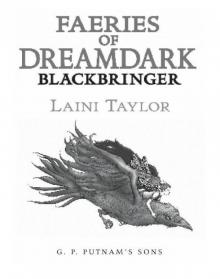 Blackbringer
Blackbringer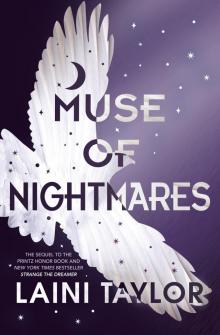 Muse of Nightmares
Muse of Nightmares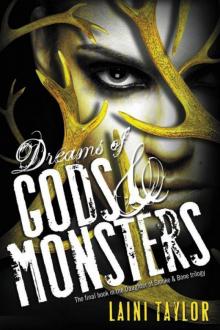 Dreams of Gods & Monsters
Dreams of Gods & Monsters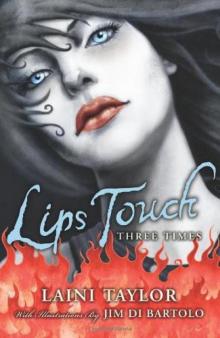 Lips Touch: Three Times
Lips Touch: Three Times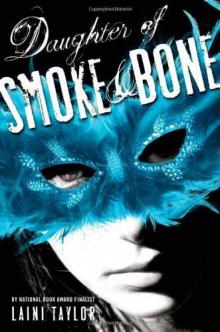 Daughter of Smoke & Bone
Daughter of Smoke & Bone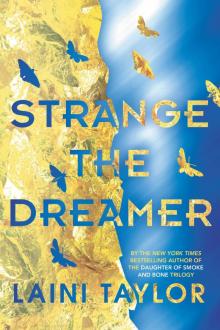 Strange the Dreamer
Strange the Dreamer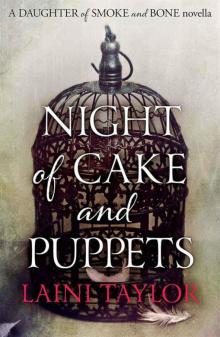 Night of Cake & Puppets
Night of Cake & Puppets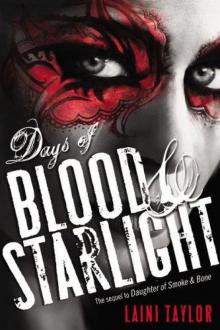 Days of Blood & Starlight
Days of Blood & Starlight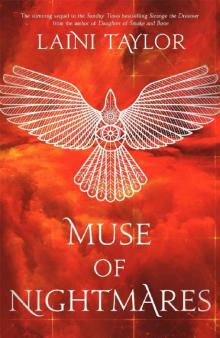 Muse of Nightmares (Strange the Dreamer #2_UK)
Muse of Nightmares (Strange the Dreamer #2_UK)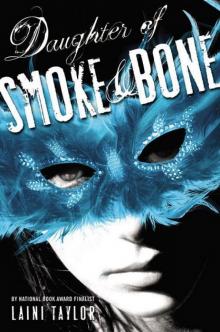 Daughter of Smoke and Bone dosab-1
Daughter of Smoke and Bone dosab-1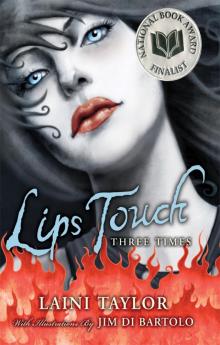 Three Times
Three Times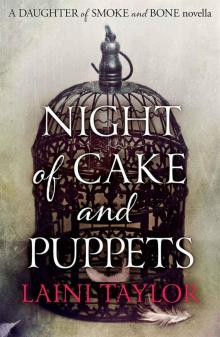 Night of Cake and Puppets (a Daughter of Smoke and Bone novella)
Night of Cake and Puppets (a Daughter of Smoke and Bone novella)